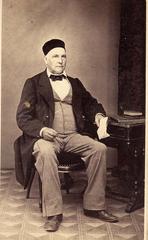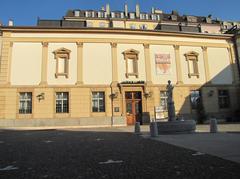
Archives de l’État de Neuchâtel: Visiting Hours, Tickets, and Visitor Information
Date: 15/06/2025
Introduction
The Archives de l’État de Neuchâtel (AEN) are the principal repository for the documentary heritage of the Republic and Canton of Neuchâtel, Switzerland. With collections spanning over seven centuries, the AEN preserve invaluable records that illuminate the region’s social, political, and cultural evolution—from its medieval roots, through Prussian rule, to its present status in the Swiss Confederation. Whether you are a researcher, genealogist, student, or traveler, a visit to the AEN offers a unique opportunity to explore the rich history of Neuchâtel in an accessible and engaging environment. This comprehensive guide provides all the practical information you need, from visiting hours and ticketing policies to collection highlights and travel tips (ne.ch; archivesne.ch; Arbido, 2018).
Table of Contents
- Introduction
- History and Significance
- Collections and Highlights
- Visitor Information: Hours, Tickets & Access
- Planning Your Visit: Facilities, Accessibility, and Travel Tips
- The New Centre for Archives and Heritage (CAP)
- Digital Resources and Online Access
- Community Engagement and Partnerships
- Nearby Attractions
- Frequently Asked Questions (FAQ)
- Contact Information
- Conclusion and Further Resources
History and Significance
The AEN’s origins trace back to the 19th century, reflecting Neuchâtel’s transition from a principality to a Swiss canton. Systematic preservation efforts began as part of the region’s modernization, ensuring continuity of governance and safeguarding cultural memory. Today, the AEN’s collections include records from feudal lordships, administrative documents from the Prussian era, materials from Neuchâtel’s revolutionary period, and extensive holdings from the modern republic (archivesne.ch).
The archives not only document political and legal developments but also capture the day-to-day life, economic activities, and social changes that have shaped the canton. The AEN’s mandate is to collect, preserve, and make accessible this documentary heritage, supporting transparency, research, and public engagement.
Collections and Highlights
The AEN houses approximately 400 archival fonds, encompassing nearly 12 kilometers of documents. Notable holdings include:
- State and Municipal Records: Documents from the Grand Council, local administrations, and judicial bodies spanning centuries.
- Civil Status Registers: Birth, marriage, and death records over 110 years old, invaluable for genealogical research (sngenealogie.ch).
- Private Fonds: Collections such as the Charles Froidevaux fonds, illustrating economic history from 1589 to 1818.
- Maps and Photographs: Extensive cartographic materials and visual documentation of Neuchâtel’s evolving landscape.
- Audiovisual and Iconographic Materials: Photographs, postcards, plans, and historical recordings.
These resources provide an immersive window into the political, social, industrial, and cultural fabric of Neuchâtel.
Visitor Information: Hours, Tickets & Access
Current Opening Hours:
- Monday to Friday: 9:00 AM – 5:00 PM
- Closed on weekends and public holidays
Admission:
- Entry is free of charge.
- Advance booking is highly recommended, especially for research visits or guided tours.
Registration:
- All visitors must register at the reception.
- First-time visitors are required to show a valid ID and complete a short form.
Accessibility:
- The AEN is fully wheelchair accessible.
- Staff are available to assist visitors with reduced mobility or special needs.
Photography:
- Personal photography (without flash or tripod) is allowed; always confirm current policies with staff.
Special Closures:
- The archives may close for public holidays, summer breaks (e.g., August 4–15, 2025), or maintenance (Neuchâtel Ville).
- Always check the official website for updates.
Planning Your Visit: Facilities, Accessibility, and Travel Tips
Location:
- Archives de l’État de Neuchâtel
- Rue de l’Hôpital 4, 2000 Neuchâtel, Switzerland
Getting There:
- Centrally located, a short walk from Neuchâtel train station and major bus stops.
- Limited parking is available; public transport is recommended.
- Bicycle-friendly access supports the city’s “mobilité douce” initiative.
Facilities:
- Reading rooms with reference materials and Wi-Fi.
- Lockers for personal items (bags and coats not permitted in reading areas).
- Restrooms and cloakroom on-site.
- No café, but many dining options nearby.
Staff Support:
- French is the primary language, but English and German assistance is often available.
- For specialized research, contact the archives in advance.
The New Centre for Archives and Heritage (CAP)
Overview
A major modernization project is underway: the new Centre for Archives and Heritage (CAP) will centralize all AEN collections and partner institutions, offering state-of-the-art conservation, expanded research spaces, and improved accessibility (NE.ch, 2025; Arbido, 2018).
Key Features:
- Climate-controlled storage for over 10 km of documents
- Spacious reading and consultation areas
- Enhanced digital infrastructure and online catalogue access
- Public exhibition and educational spaces
- Full accessibility for visitors with reduced mobility
- Environmentally friendly, energy-efficient design
Timeline:
- As of June 2025, planning and approvals are complete; construction is underway. The opening is expected within the next few years.
Digital Resources and Online Access
The Portail des Archives neuchâteloises provides digital inventories and access to selected digitized documents. Users can consult finding aids, search collections remotely, and explore online exhibitions. Historical newspapers and other resources are accessible via partner platforms such as e-newspaperarchives.ch.
Community Engagement and Partnerships
The AEN collaborates with local and national libraries, museums, and heritage organizations, including the Bibliothèque publique et universitaire de Neuchâtel and Bibliothèque de la Ville de La Chaux-de-Fonds. Community outreach includes:
- Exhibitions and guided tours
- Workshops for schools and universities
- Projects highlighting underrepresented groups (e.g., women’s history: meta.wikimedia.org)
- Volunteer and crowdsourcing opportunities
Nearby Attractions
Combine your visit to the AEN with other Neuchâtel highlights:
- Neuchâtel Castle and the Collegiate Church
- Musée d’Art et d’Histoire (Musée d’Art et d’Histoire)
- Scenic Lake Neuchâtel promenade (Lake Neuchâtel)
- The historic old town with shops, restaurants, and cafes
Frequently Asked Questions (FAQ)
Q: What are the opening hours?
A: Monday to Friday, 9:00 AM – 5:00 PM. Closed weekends and public holidays.
Q: Is there an entry fee or need for tickets?
A: No, admission is free. Registration at reception is required.
Q: Are guided tours available?
A: Yes, during special exhibitions or by appointment. Check the website for schedules.
Q: How can I request documents in advance?
A: Use the online inventory and email [email protected] with your request.
Q: Is the site accessible for wheelchair users?
A: Yes, the building and facilities are fully accessible.
Q: Can I access collections online?
A: Selected inventories and digitized documents are available through the Portail des Archives neuchâteloises.
Contact Information
- Address: Rue de l’Hôpital 4, 2000 Neuchâtel, Switzerland
- Telephone: +41 32 717 79 57
- Email: [email protected]
For the most current information, always consult the official website.
Conclusion and Further Resources
The Archives de l’État de Neuchâtel are a cornerstone of regional heritage, offering free and accessible entry to centuries of historical treasures. With the forthcoming Centre for Archives and Heritage (CAP), visitors will benefit from modern, centralized facilities and enhanced digital resources. Whether conducting research, tracing family roots, or simply exploring Neuchâtel’s past, the AEN welcomes all to discover, learn, and engage with history.
Plan your visit by browsing online inventories, contacting staff for document requests, and exploring Neuchâtel’s vibrant cultural offerings. Stay updated by following the AEN and CAP on social media and downloading the Audiala app for the latest news and event listings.
Sources and Official Links
- Archives de l’État de Neuchâtel: Hours, Tickets, History, and Visitor Guide, 2025
- Portail des Archives neuchâteloises
- Archives de l’État de Neuchâtel: Research and Access
- Centre for Archives and Heritage (CAP): Project Information
- Arbido, 2018: New Building Methodology
- Wikipedia: Archives de l’État de Neuchâtel








